Struggling Nutritionists
A new study shows that cutting back on salt may not be as beneficial for your heart as nutritionists once thought.
While a diet low in salt can have a small effect on blood pressure, it increases the levels of cholesterol, fat and hormones in the blood that are known to increase the risk of heart disease.
iScientist™ ©2012
Brown Sugar
or White Sugar?
White sugar is 99.9% sucrose, brown sugar is about 97% sucrose, 2% water and 1% other stuff (mostly molasses).
Molasses can contain microscopic amounts of hundreds of vitamins and minerals - or harmless but scary-looking bacteria.
Sucrose, our regular table sugar, is the combination of glucose and fructose.
Each sugar has six carbon atoms, 12 hydrogen atoms and six oxygen atoms arranged into a rough circle, with the atoms arranged differently for each sugar.
But the real differences between white and brown sugars are their colors.
iScientist™ ©2012
Get Fat with Fruits!
Our body burns the glucose immediately for energy.
If glucose is not needed for energy immediately, then it is converted into glycogen in the liver or in the muscles.
If the body has an excess of glucose, and all of the glycogen stores are full, the surplus glucose is converted to fat by the liver and stored as bodyfat around the body.
The sugar of fruits, fruit juices, or any of the derivatives is known as fructose. Our muscles do not have the necessary enzymes to synthesize fructose into glycogen.
Only the liver is able to convert fructose into liver glycogen. Once its stores are full, the liver is signaling the body to store glucose as glycogen or convert it to fat.
In essence, fruit sugar is easily converted to fat.
It would only take three 2.5 dl glasses of orange juice to fully replenish liver glycogen stores.
After that, fructose is converted to fat and released back into the bloodstream to be stored as bodyfat.
Therefore be careful:
A fruit is a healthy food, full of nutrients, high in fiber, vitamins, minerals, and itself low in fat and calories - but once in your body it can produce quite a lot of bodyfat!
iScientist™ ©2012
Drink Coffee!
According to data analyzed by Harvard Researchers drinking between 5-6 cups of coffee a day cut the chances of men suffering from Type 2 Diabetes by 54% and cut the chances of women suffering from the same by 30%!
Studies carried out by the Scottish Heart Healthy group show that men and women between the ages of 40 and 59 who drink large quantities of coffee were more likely to lower their chances of dying from heart disease.
The anti-oxidants your coffee provides is also lowering the risk of suffering from Parkinson's Disease, the study showed, but the coffee must contain caffeine to be effective.
iScientist™ ©2012
|

Thailand is a real paradise for the fruit lovers. A diverse selection of fruits is easily found at numerous fruit shops, supermarkets and market places. Lots of street vendors sell seasonal fruits on sidewalks, in tourist's spots or right on the beaches. Thai vendors usually retail what is called 'ready to eat' fruit, by hand or with a wooden stick in a plastic bag. Thai fruits will pleasantly surprise you.
|
Durian
Thai: Thu-Rian
The king of fruits!
A delicacy that consists of several large inedible seeds covered with the creamy golden flesh, altogether hidden within the spiny exterior of this really unique and exotic treat. Durians are found in many varieties, of which the most popular one is called 'mon thong'.
Season: May to August
| 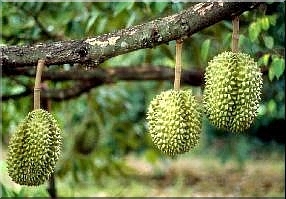
|
Coconut
Thai: Ma-Phrao-On
Coconuts as well as tall coconut palms are inescapable in Thailand. Thai coconuts are found in many varieties, which most commonly consist of the sweet light juice surrounded by white flesh tender, both of which are often eaten fresh.
Season: Year-around
| 
|
Banana
Thai: Kluai Nam Wa
Bananas are likely the most popular tropical fruit, and Thailand has around 20 varieties.
Season: Year-around
| 
|
Mangosteen
Thai: Mang-Khud
Mangosteen is one of the tastiest fruits found in Thailand. It has a thick and stony dark-red skins with juicy white flesh.
Season: April to September
| 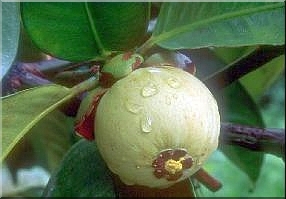
|
Mango
Thai: Ma-Muang
Mango, the large oval smooth-skinned specimen with juicy aromatic flesh and a large hairy seed, is definitely among best tropical fruits. There are more than a dozen mango varieties growing in Thailand.
Season: March to June
| 
|
Papaya
Thai: Ma-la-Kor
The long yellow or orange fruit is rich in Vitamins A and C. In its most popular use, green papayas are sliced into thin strips and ground together with dried shrimp, garlic, and hot chilies to produce a fiery salad called 'som tam'.
Season: Year-around
| 
|
Orange
Thai: Som or Som Khiao Wan
This fruit is called 'orange' in Thailand, but in reality it is some kind of uncultivated tangerine. Sweet, aromatic and juicy.
Thai 'oranges' are not nice to look on, but their taste is unexcelled by any other orange.
Season: Year-around
| 
|
Lime
Thai: Ma-Nao
Thai limes are smaller and sweeter than western ones. Fresh lime juice is valued as a drink by mixing up with salt and sugar, and is also used in salad dressings.
Season: Year-around
| 
|
Lychee
Thai: Lin-Chi
Originally perceived as Chinese fruit, lychee is a thin brittle shell enclosing a sweet jellylike pulp and a single seed.
Season: April to June
| 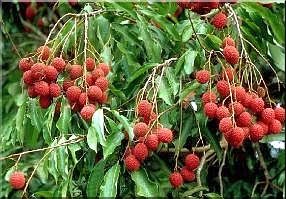
|
Tamarind
Thai: Ma-Kam
The fruit is a sweet variety of a fruit generally associated with an acid taste. After being peeled it is generally eaten fresh.
Season: December to March
| 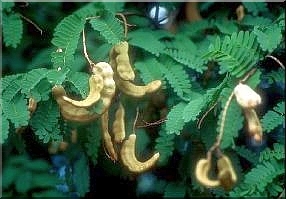
|
Pomelo
Thai: Som-Oh
This is the Thai version of a grapefruit, but with a sweet taste and considerably larger. The flesh may be pale yellow, orange or red.
Season: August to November
| 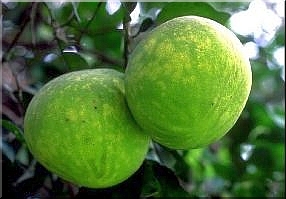
|
Custard Apple
Thai: Noi-Naa
Also known as sugar apple, this fruit has a lumpy green skin covering masses of sweet, scented white flesh.
Season: June to September
| 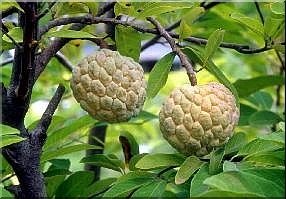
|
Guava
Thai: Fa-Rang
Guava is one of the most popular fruits for snacks, eaten either ripe or when still green dipped in a bit of salt or sugar.
Season: Year-around
| 
|
Grape
Thai: A-ngune
Most of grape varieties growing in Thailand were developed at the Kasetsart Agricultural University to thrive under tropical conditions. Both red and green species are sweet and delicious whether eaten fresh or drunk as juice.
Season: September to April
| 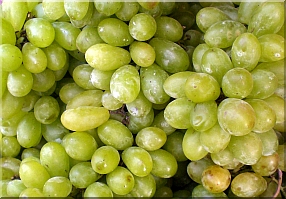
|
Pineapple
Thai: Sapparot
Thai pineapples are famous for their sweet taste and found in widespread varieties upon its consumption.
Thai pineapples are more tasty and sweeter than pineapples from other parts of the world.
Season: Year-around
| 
|
Watermelon
Thai: Taeng-mo
Watermelon is certainly one of the most popular and widely available fruits. In Thailand sweet and refreshing chunks of watermelon are an essential part of nearly every fruit platter.
Season: Year-around
| 
|
Jackfruit
Thai: Ka-Noon
The fruit has a grey skin, but inside the fruit is yellow and succulent, of a sweet taste and powerful smell. Thais eat the yellow flesh alone.
Season: January to May
| 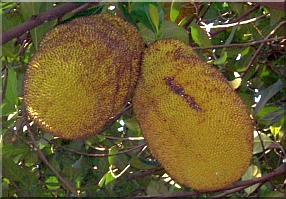
|
Star Fruit
Thai: Ma-Feung
The star-shaped carambola is not a native species but is grown throughout Thailand. It is sweet and juicy with a slightly sour taste.
Season: October to December
| 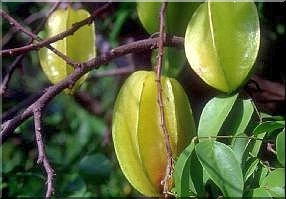
|
Longkong
Thai: Lam-Yai
Longkong has smoky white flesh, its taste is sweet and at the same time slightly sour.
Season: July to September
| 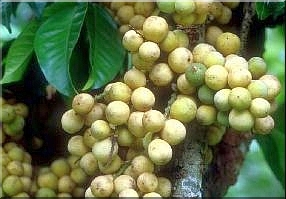
|
Gooseberry
Thai: Ma-Yom
Small yellow berries used in desserts and jams. Taste is a bit sour.
Season: March to May
September to October
December to January
| 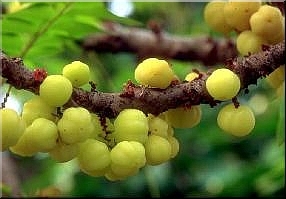
|
Rose Apple
Thai: Chom-Poo
Rose Apple has a green or pink edible skin. It is crunchy and slightly acidic in taste.
Season: Year-around
| 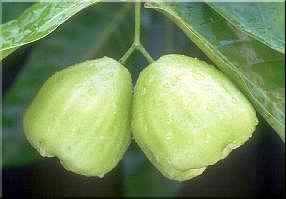
|
| Rose Apple too
|
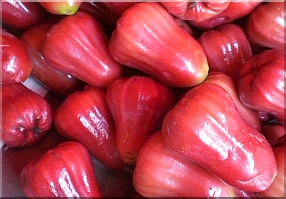
|
Pome Granate
Thai: Tap-Tim
The skin of the Pomegranate is leathery in texture and orange to orange-red in colour. The edible portion of the fruit is the juicy red flesh and there are many seeds inside, it has a slightly sour taste.
Season:
| 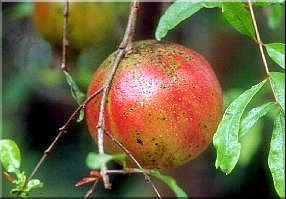
|
Zalacca
Thai: La-Kham
The zalacca has a thin red-orange skin over a sweet, but tart fruit inside - an acquired taste.
Season: December to May
| 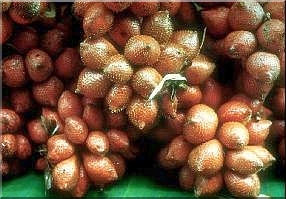
|
Rambutan
Thai: Ngo
Rambutan is one of the most attractive and popular delicacies in Thailand. A ruby-red oval in size of a ping-pong ball covered with soft greenish spines. The skin is easily peeled off revealing its pleasant jellylike pulp.
Season: May to September
| 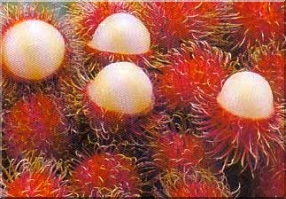
|
Dragon Fruit
Thai: Geow-Man-Gon
Dragon Fruit or Pithaya is covered with distinguished scales and can get up to 5" long. Enclosed in the thin rind is a large mass of sweetly flavored pulp and numerous small black seeds.
Season: Year-around
| 
|
Rambeh or Burmese Grape
Thai: Ma-Fai
The ripened fruits are sweet with a subacid flavor. Pell skin and eat fruit, discarding seed. The fruit is oval, colored yellowish, pinkish to bright red or purple, 2.5-3.5 cm in diameter, glabrous, with 2-4 large purple-red seed, with white aril. It is also used medicinally to treat skin diseases.
Season: April to May
| 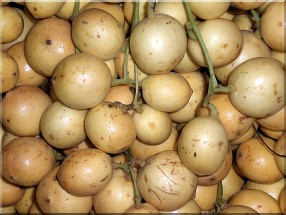
|
Passion Fruit or Purple Granadilla
Thai: Sao wa ros
Thailand's passion fruit has a brittle, wrinkled purple-brown rind enclosing flesh-covered seeds, something like a pomegranate. Passion fruit is more commonly sieved and its highly aromatic pulp and juice are used as a flavoring for beverages and sauces. The pulp has an intense aromatic flavor, while the texture is jelly-like and watery. The flavor is likened to guava. The seeds yield 23% oil which is similar to sunflower and soybean oil and accordingly has edible as well as industrial uses.
Season: All year round
| 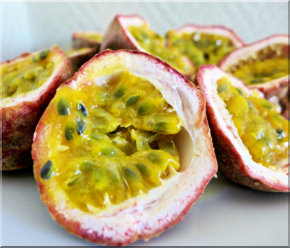
|
|
Try it:
A double-click in an empty space brings you back to the top of the page!
This feature should work on most browsers.
NightWalker's Pattaya News Flash is covering Pattaya by Day, Pattaya at Night, Phatthaya, its Resorts and Beaches, Naklua, Jomtien and Chomtian. News and Stories covers Bars, Dancings, A Go-Go and Coyote Clubs, Shows and all other Entertainment Venues, Pattaya's Citizens including real Men, Ladies & Girls, Thai Hybrids, Lady Boys, Shemales, Gays and Thailand's highly skilled workforce, Massage Parlours, Spa, Hotels, Apartments, Guest Houses, Short Time and Long Time Motels, Resorts, Bungalows or Rooms, Restaurants and Food Courts, Shopping Centers, City Hall, Hospitals, Dental, Beauty & any other Clinics, Health Care, Charity, Visa Regulations, Radio and Television Stations and their Broadcasts, Music, Concerts, Suvanabhumi and U-Tapao Airports, Property, Mobile Phones, Traffic, Festivals and all other kinds of Events, Photos, Movies and other Pictures, including Street Maps from Pattaya and Thailand as a whole. NightWalker also reports from the Funny Side of Pattaya and doesn't forget to mention the World's latest and most interesting Gadgets and Technology Achievements and Thailand's never ending battles against prostitution and its notorious but famous and popular copycat product industry.
|






























